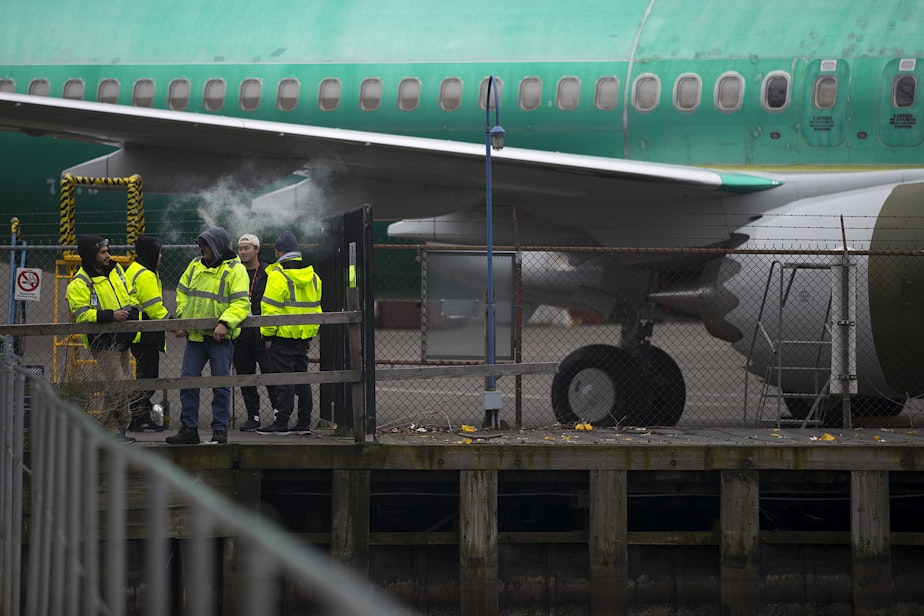At the the heart of Boeing's crisis, questions about company culture

The Boeing Company will release what is bound to be a tough earnings report this week.
The 737 Max remains grounded amid many questions: How could a safety crisis of this magnitude develop at this plane-maker? Is there something about its company culture that has to change?
There’s an old saying in Seattle: scratch people around here and they bleed Boeing blue. Jon Fehrenbach says that’s him. He’s a former Boeing engineer who rose through management before retiring a few years ago.
Boeing hit by first annual loss in 20 years
He’s been watching as the company he was so proud to work for is raked over the coals. Nine months ago, a second crash of a relatively new 737 MAX forced the grounding of the jet worldwide.
“It’s been the hardest thing for me to watch, as an outsider, to see the engineering reputation of the company take such a hit,” he said. “It’s engineering and it has always been a hallmark of Boeing.”
The promise of the Max was fuel-efficient engines on a trustworthy plane. But there was another difference between it and past models of Boeing’s best-selling 737: the Maneuvering Characteristics Augmentation System (MCAS). This system helped the MAX fly like a 737 despite the low hang of the fuel-efficient engines.
But that system was found to have overpowered the pilots and put the planes into a nosedive in two crashes that killed 346 people.
At a hearing last October Congressman Peter DeFazio castigated the company.
“We don’t know why Boeing designed a plane with a critical system assigned to a single point of failure,” he said, as a chastened Dennis Muilenburg, then CEO of Boeing, looked on. “Inexplicable. Inexcusable and as far as I know unprecedented in the history of passenger aviation.”
Defazio called it a broken safety culture. Fehrenbach said this was not the Boeing he recognized.
“There needs to be a culture change. How do you enact that culture change? I’m not that wise.”
Boeing’s new CEO, David Calhoun, took on the issue of Boeing's culture in a recent conference call with reporters. He responded to Boeing’s own disclosure of internal messages that show employees deriding the Max, its customers, and its regulators.
“It is totally appalling," Calhoun told journalists in the recent conference call. “We will be on the lookout for every pocket that exhibits anything close to that behavior. But I do believe it was a micro-culture. But it’s our responsibility to hunt for micro-cultures because eventually they become big cultures.”
Company culture
How could such a culture, minor or major, show up at Boeing? In documents and in conversations, current and former Boeing employees talk about two decades of cost cutting pressure building up inside the company.
They have theories – that it was Boeing’s merger with McDonnell Douglas that started a shift in the culture. Or that it was the corporate move to Chicago, away from the engineering center.
Or that it was the sheer cost of developing the 787. The plane was much more expensive to develop than Boeing assumed, and much more challenging. Some people wonder if the example of the 787 helped executives prefer extending the life of the 737, instead of building a new plane from scratch.
Aerospace analyst Michel Merluzeau says the cultural problem goes back further, perhaps 30 years. He sees it as connected to Boeing’s competition with Airbus.
“What we have with the Max crisis is the expression of a company that tries and is very innovative in so many different areas but that is still struggling to transform,” he said. “You’ve got bastions for the right or the wrong reasons that are not altering their ways of doing things.”
The 737 has been gradually losing ground to Airbus planes. Twice now, Boeing has had to create new versions – including the Max – because key Boeing customers were choosing Airbus.
“I hear these two words: arrogance and lazy B,” Merluzeau said. “Lazy Boeing. Arrogance is an expression of 'This is the way we’ve done things, this is the way we're going to continue doing things.'”
It's hard to put a finger on exactly what led to the chain of events that produced the Max. But Boeing has new leadership and a plan to turn away from its horrible year - while standing by its plane.
“Nothing more important than the return of the Max,” Calhoun said. “Nothing more important than standing up improvements in the engineering function and nothing more important than shining bright lights on the safety process. "
And that, he says, is what the company will do all year.



